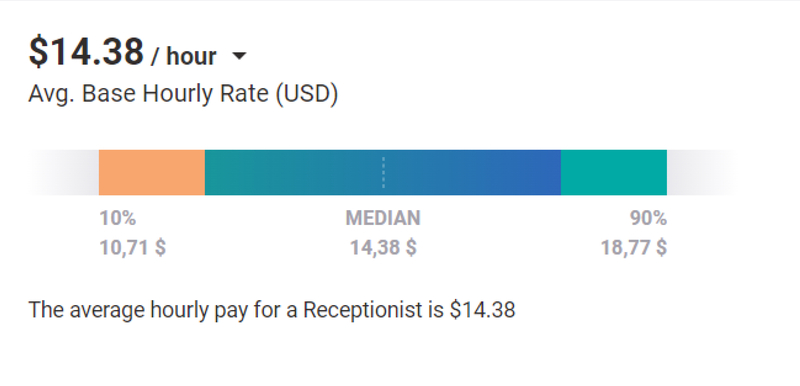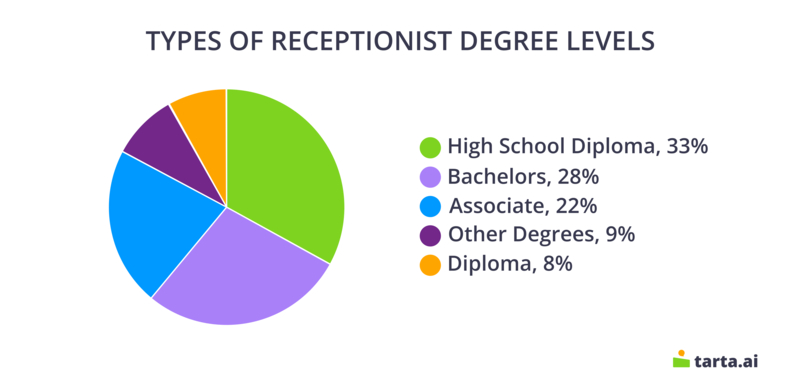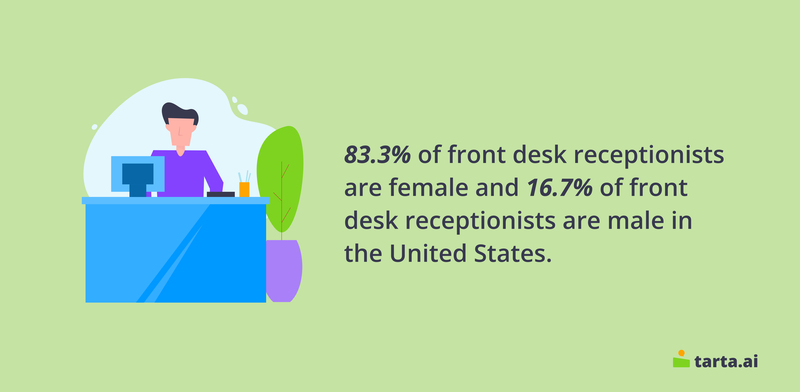Receptionist Job Description: The First Point of Contact for Your Business

Interesting fact: The word receptionist dates from about 1900, when the earliest receptionists were hired to work in photography studios.
Job Description
A receptionist is often the first point of contact for visitors to a business, and as such, plays a critical role in creating a positive first impression.Receptionists are responsible for greeting and welcoming visitors, answering and directing incoming phone calls, scheduling appointments, and performing administrative tasks such as filing, data entry, and preparing documents.
Receptionists can be found in a variety of industries, including medical offices, law firms, government agencies, schools, and corporate offices. They typically work in an office setting and are expected to be presentable and professional in their appearance and demeanor. The job may require working flexible hours, including evenings and weekends.
Requirements
While a high school diploma or equivalent is typically required for a receptionist position, some employers may prefer candidates with an associate's or bachelor's degree in a related field. Additionally, previous experience in a customer service or administrative role may be preferred.
Strong communication skills, both verbal and written, are essential for a receptionist. They must be able to effectively communicate with visitors, callers, and employees, as well as write clear and concise emails and messages. The ability to speak multiple languages may be an asset, especially in areas with diverse populations. Proficiency in basic computer skills, such as Microsoft Office, is also important.
Note: The average age of an employed receptionist is 41 years old.
Main Responsibilities
The main responsibilities of a receptionist typically include:
- Greeting Visitors: In addition to greeting visitors, a receptionist may be responsible for verifying identification and ensuring that visitors sign in and out of the building. They may also be responsible for issuing visitor badges and providing basic information about the business.
- Answering Phone Calls: A receptionist must be able to handle a high volume of phone calls and direct them to the appropriate person or department. They may also be responsible for screening calls and forwarding urgent messages to the appropriate person.
- Scheduling Appointments: A receptionist must be able to manage a busy schedule and schedule appointments efficiently. They must be able to communicate with individuals both in person and over the phone to confirm appointments and reschedule as necessary.
- Administrative Tasks: A receptionist must be proficient in basic computer skills, such as typing, data entry, and email. They may be responsible for maintaining a database of client information, preparing reports, and drafting correspondence.
Additional Duties
In addition to the main responsibilities listed above, receptionists may also be responsible for additional duties, such as:
- Managing Deliveries: A receptionist may be responsible for managing incoming and outgoing mail and packages.
- Conference Room Management: A receptionist may be responsible for managing conference room reservations and ensuring that the room is set up appropriately for meetings.
- Providing General Administrative Support: A receptionist may be responsible for providing general administrative support to other employees, such as photocopying, scanning, and faxing documents.
Skills
Receptionists play a crucial role in creating a positive first impression for visitors and callers to a business. In addition to the main responsibilities and additional duties discussed in the previous sections, receptionists must possess a variety of hard and soft skills to be successful in their role.
Hard Skills | Skill Description | Soft Skills | Skill Description |
Computer Skills | Proficient in basic computer skills, such as using word processing software, email, and spreadsheets. | Communication Skills | Excellent verbal and written communication skills to effectively communicate with visitors, callers, and employees. |
Phone Etiquette | Ability to answer calls promptly, speak clearly and professionally, and handle difficult callers. | Customer Service Skills | Ability to provide excellent customer service by being friendly, welcoming, and accommodating to visitors and callers. |
Typing Speed | Ability to type quickly and accurately to keep up with the demands of the job. | Multitasking | Ability to juggle multiple tasks at once, including answering phones, scheduling appointments, and performing administrative tasks. |
Language Skills | Knowledge of multiple languages may be beneficial for receptionists who work in areas with diverse populations. | Organization | Highly organized and able to prioritize tasks to ensure that all duties are completed accurately and on time. |
Knowledge of Office Equipment | Familiarity with standard office equipment, such as copiers, scanners, and fax machines, and know how to troubleshoot common problems. | Attention to Detail | Keen eye for detail to ensure that all information is recorded correctly, appointments are scheduled accurately, and messages are delivered to the correct recipient. |
Receptionist Salary
The average salary for a receptionist in the United States is around $31,000 per year.
PayScale, a website that collects salary data from employees and employers, reports that the average hourly wage for a receptionist in the United States is $14.38, as of February 2023.

Source: Payscale
Here is a breakdown of the average salary for receptionists in different states:
State | Average Annual Salary |
California | $37,600 |
New York | $35,300 |
Massachusetts | $34,400 |
District of Columbia | $34,100 |
Alaska | $33,600 |
Hawaii | $32,400 |
Connecticut | $32,300 |
Virginia | $32,200 |
Maryland | $31,800 |
Delaware | $31,700 |
Note: The finance industry is the highest-paying for receptionists.
Factors That Influence Earnings
Several factors can influence a receptionist's earnings, including:
- Industry: Receptionists who work in high-paying industries such as healthcare or legal services tend to earn more than those who work in lower-paying industries like retail or hospitality.
- Location: Receptionists who work in states or cities with a higher cost of living tend to earn more than those in areas with a lower cost of living.
- Education and Experience: Receptionists with higher education levels or more experience tend to earn higher salaries than those with less education or experience.
Payscale reports that entry-level receptionists with less than one year of experience earn an average hourly wage of $12.19, while those with 1-4 years of experience earn an average hourly wage of $13.71. Receptionists with 5-9 years of experience earn an average hourly wage of $15.37, and those with 10-19 years of experience earn an average hourly wage of $16.13. Receptionists with more than 20 years of experience earn an average hourly wage of $16.66.
Ways to Improve Earnings
If you're a receptionist looking to increase your earnings, here are some ways to do so:
- Pursue additional education or certifications: Earning additional education or certifications can help you qualify for higher-paying receptionist positions or advance to other administrative roles.
- Seek out higher-paying industries: Consider seeking out receptionist positions in industries that tend to offer higher salaries, such as healthcare or legal services.
- Negotiate your salary: Don't be afraid to negotiate your salary during the hiring process or during performance evaluations.
Additional Benefits
Receptionists may be eligible for additional benefits such as health insurance, paid time off, retirement plans, and other perks depending on the employer. Some employers also offer training and development opportunities to help receptionists advance their careers.
Interesting fact: In some countries, such as Japan, receptionists are expected to bow when greeting visitors as a sign of respect.
Navigating the Fast-Paced Environment of Receptionist Work
Settings and tools
Receptionists work in a variety of settings including offices, medical facilities, hotels, and government agencies. Office settings may include law firms, accounting firms, consulting companies, and other professional services firms. Medical facilities may include hospitals, clinics, and dental offices. Hotels may have front desk receptionists who handle guest check-in and check-out, while government agencies may have receptionists who handle incoming calls and visitors.
Receptionists typically use a variety of tools to perform their job duties. This may include office equipment such as computers, phones, fax machines, copiers, and scanners. They may also use specialized software for scheduling appointments, managing client databases, and other administrative tasks. In medical facilities, receptionists may use electronic health record (EHR) systems to access patient information.
The work schedule for receptionists may vary depending on the industry and company. Many receptionists work full-time, typically during regular business hours. Some may work part-time or have flexible schedules. In certain settings, such as hospitals or hotels, receptionists may need to work evening, overnight, or weekend shifts to ensure coverage for 24-hour operations.
Job Environment | Description of Settings | Description of Tools | Work Schedule |
Offices | Law firms, accounting firms, consulting companies | Computers, phones, fax machines, copiers, scanners, specialized software | Full-time, regular business hours |
Medical facilities | Hospitals, clinics, dental offices | Computers, phones, EHR systems | Full-time, part-time, flexible schedules |
Hotels | Front desk receptionists | Computers, phones, reservation software | 24-hour operations, various shifts |
Government agencies | Receptionists for incoming calls and visitors | Computers, phones, security systems | Full-time, regular business hours |
Education requirements
The education requirements for a receptionist typically do not require a Bachelor's degree, Master's degree, or Ph.D.. In most cases, a high school diploma or equivalent is sufficient for employment as a receptionist. However, having additional education or training in business administration or customer service can be beneficial.

Training programs
Customer service and administrative support programs are designed to provide students with the skills and knowledge they need to excel in roles that involve interacting with customers, clients, or colleagues in a professional setting. These programs are typically offered by community colleges, vocational schools, or online education providers.
Some common courses in these programs may include:
- Communication Skills: These courses focus on developing effective verbal and written communication skills, including listening, speaking, and writing.
- Customer Service Techniques: These courses teach students how to provide excellent customer service, including handling customer complaints, resolving conflicts, and providing product or service information.
- Office Technology: These courses focus on using various software applications and office equipment, including word processing, spreadsheets, databases, and fax machines.
- Administrative Support: These courses teach students the fundamentals of administrative support, including organizing and scheduling appointments, managing paperwork, and maintaining records.
- Business Ethics: These courses focus on developing ethical decision-making skills in the workplace, including understanding professional responsibilities and navigating ethical dilemmas.
Professional associations
There are several professional associations that receptionists can join to network with other professionals and stay up to date on industry news and trends. These include the International Association of Administrative Professionals (IAAP) and the National Association of Professional Receptionists (NAPR).
The International Association of Administrative Professionals (IAAP) is a professional association for administrative professionals that provides networking opportunities, professional development resources, and certifications such as the Certified Administrative Professional (CAP).
The National Association of Professional Receptionists (NAPR) is a professional association specifically for receptionists and administrative support staff that offers resources and networking opportunities to members.
Other professional associations that may be relevant to receptionists include the International Customer Service Association (ICSA) and the Professional Association of Customer Engagement (PACE).
Licenses and Certifications
Upon completion of a customer service or administrative support program, students may be able to earn certifications in relevant areas, such as Certified Customer Service Professional (CCSP) or Certified Administrative Professional (CAP). These certifications can demonstrate a candidate's expertise and may improve their job prospects or earning potential in the field.
The Certified Customer Service Professional (CCSP) certification is offered by the Customer Service Institute of America and can demonstrate a candidate's proficiency in areas such as customer experience strategy, leadership, and measurement.
Similarly, the Certified Administrative Professional (CAP) certification is offered by the International Association of Administrative Professionals (IAAP) and can demonstrate a candidate's expertise in areas such as communication, organization, and technology. These certifications can improve a candidate's job prospects or earning potential in the field.
Some of the most famous receptionists in pop culture include Pam Beesly from "The Office," Joan Holloway from "Mad Men," and Tess McGill from "Working Girl."

Career Paths
As a receptionist, there are various ways to develop your career and move up the ladder. Here are some options:
- Gain more skills: You can take courses or get certified in skills related to your field, such as customer service, office administration, or communication skills. This can make you a more valuable employee and qualify you for higher-paying positions.
- Move up to a managerial role: With experience, you can progress to a supervisory or managerial role, overseeing a team of receptionists or managing the front desk operations of an entire company.
- Transition into a related field: You can also leverage your experience as a receptionist to move into a related field such as customer service, human resources, or office administration.
- Start your own business: If you have an entrepreneurial spirit, you can use your receptionist experience to start your own business, such as a virtual receptionist service or a concierge service.
Subfields of receptionist work
Subfields of Receptionist Work | Job Responsibilities |
Front Desk Receptionist | Answering phones, greeting visitors, handling administrative tasks |
Medical Receptionist | Answering phones, scheduling appointments, dealing with patients |
Legal Receptionist | Greeting clients, scheduling appointments, assisting with legal administrative tasks |
Hotel Receptionist | Checking in guests, handling reservations, providing information about hotel amenities |
Real Estate Receptionist | Answering phones, scheduling appointments, handling administrative tasks related to property transactions |
Dental Receptionist | Answering phones, scheduling appointments, dealing with patients in a dental office |
Salon Receptionist | Greeting clients, scheduling appointments, handling administrative tasks related to beauty services |
Event Receptionist | Greeting guests, handling registrations, providing information about the event |
Alternative careers or similar jobs
Alternative Careers/Similar Jobs | Job Responsibilities |
Supporting the day-to-day operations of an office, scheduling appointments, handling phone calls and emails, managing documents | |
Interacting with customers, answering questions, resolving complaints or issues | |
Personal Assistant | Working closely with an individual, managing their schedule, handling administrative tasks, and assisting with personal matters |
Office Manager | Overseeing the operations of an office, managing staff, handling administrative tasks, and ensuring the smooth running of day-to-day operations |
Inputting data into computer systems, updating records, managing databases | |
Call Center Representative | Handling incoming and outgoing phone calls, providing customer support, resolving complaints |
Executive Assistant | Working closely with high-level executives, managing their schedule, handling administrative tasks, and assisting with strategic decisions |
Project Coordinator | Overseeing the planning and implementation of projects, liaising with different teams, ensuring projects are completed on time and within budget |

Photo: Freepik
Job Market
The demand for receptionists varies depending on the industry and location. According to the Bureau of Labor Statistics (BLS), the employment of receptionists is projected to show little or no change from 2021 to 2031.
Despite limited employment growth, about 142,300 openings for receptionists are projected each year, on average, over the decade. Most of those openings are expected to result from the need to replace workers who transfer to different occupations or exit the labor force, such as to retire.
The outlook for receptionist jobs may also depend on the specific subfield or industry. For example, medical receptionists are expected to see faster than average job growth due to an aging population and an increasing demand for healthcare services.
Interesting fact: The International Association of Administrative Professionals (IAAP) has designated the third full week in April as Administrative Professionals Week, with Administrative Professionals Day falling on the Wednesday of that week.
Job satisfaction
Advantages | Disadvantages |
Opportunities for career growth and advancement | May have to deal with difficult or demanding customers/clients |
Variety of job duties and responsibilities | Can be repetitive or monotonous at times |
Interaction with diverse groups of people | May have to work long hours or weekends/holidays |
Opportunity to develop and improve communication and interpersonal skills | Can be stressful, especially during busy periods or when dealing with challenging situations |
Valuable experience in customer service and administrative tasks | May have limited autonomy or decision-making power |
Can be a great entry-level job with minimal experience required | May be viewed as a low-status or low-paying job |
Depending on the industry, may have access to perks or benefits (such as discounted products/services) | May have to deal with tedious or menial tasks, such as filing or data entry |
May have opportunities to work in various industries or fields, such as healthcare, hospitality, or law | May require standing or sitting for long periods of time, which can be physically tiring |
Government Program
Government programs can offer support and resources to receptionists and other workers in various ways. Here are some examples:
- Job training programs: The government may provide funding for job training programs that can help receptionists acquire new skills or enhance existing ones.
- Unemployment benefits: If a receptionist loses their job through no fault of their own, they may be eligible for unemployment benefits, which provide financial assistance while they search for new employment.
- Healthcare programs: The government may offer healthcare programs that provide affordable or free healthcare services to receptionists and other workers who are uninsured or underinsured.
- Retirement benefits: The government may provide retirement benefits such as Social Security or pensions to help receptionists and other workers save for retirement.
- Workplace safety programs: The government may establish workplace safety programs to ensure that receptionists and other workers are protected from workplace hazards and have access to a safe working environment.
- Tax credits: The government may provide tax credits to businesses that hire receptionists and other workers from certain disadvantaged groups, such as veterans or individuals with disabilities.
- Small business assistance: The government may offer assistance to entrepreneurs who are starting their own businesses, including receptionists who are interested in starting a virtual receptionist service or a concierge service.
Overall, government programs can provide valuable resources and support to receptionists and other workers, helping them to succeed in their careers and improve their quality of life.
- Receptionists play a critical role in creating a positive first impression for visitors and callers to a business.
- They are responsible for greeting visitors, answering phone calls, scheduling appointments, and performing a variety of administrative tasks.
- The average salary for a receptionist in the United States is around $31,000 per year.
- A high school diploma or equivalent is sufficient, but additional education or training in business administration or customer service can be beneficial.
- A receptionist can earn certifications such as the Certified Customer Service Professional (CCSP) or Certified Administrative Professional (CAP) to improve job prospects and earning potential.
- Professional associations are the International Association of Administrative Professionals (IAAP), the National Association of Professional Receptionists (NAPR).
- Receptionist work includes a variety of specializations, such as bilingual receptionist, executive receptionist, legal bilingual receptionist, medical transcriptionist, technical receptionist, and corporate receptionist.
- Alternative careers or similar jobs to receptionist work include administrative assistant, customer service representative, personal assistant, office manager, data entry clerk, call center representative, executive assistant, and project coordinator.
- Receptionist work can have advantages such as opportunities for career growth, interaction with diverse groups of people, and valuable experience in customer service and administrative tasks.
FAQ
Can receptionist jobs be done remotely?
Some receptionist jobs may be done remotely, particularly in industries such as virtual receptionist services or telemedicine. However, many receptionist positions require working on-site at a physical location.
What qualifications do I need to become a receptionist?
Typically, a high school diploma or equivalent is required. Some employers may also require relevant work experience, customer service skills, and proficiency in computer software programs.
What kind of training do receptionists receive?
Receptionists may receive on-the-job training from their employer, which can include learning specific software programs and office procedures. Some may also choose to pursue training or certifications in areas such as customer service or office administration.
What is the typical salary for a receptionist?
The average salary for a receptionist in the United States is around $31,000 per year.
What are some common challenges that receptionists face?
Receptionists may face challenges such as managing a high volume of phone calls, dealing with difficult or upset clients, and balancing multiple tasks and responsibilities.
How can a receptionist improve their job performance?
By actively seeking feedback, seeking opportunities for professional development, improving their communication and customer service skills, and staying organized and focused on their tasks.